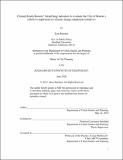Climate ready Boston? : identifying indicators to evaluate the City of Boston's efforts to implement its climate change adaptation initiatives
Author(s)
Runsten, Kara
DownloadFull printable version (2.845Mb)
Alternative title
Identifying indicators to evaluate the City of Boston's efforts to implement its climate change adaptation initiatives
Other Contributors
Massachusetts Institute of Technology. Department of Urban Studies and Planning.
Advisor
Lawrence Susskind.
Terms of use
Metadata
Show full item recordAbstract
As a leader in municipal climate change adaptation, the City of Boston has recently updated its climate projections, completed a climate vulnerability assessment, and identified several resilience initiatives. To understand whether these initiatives are leading to a less vulnerable, more resilient Boston, I offer a set of indicators the City can use to start monitoring and evaluating its adaptation efforts. To create these indicators, I analyzed Boston's vulnerability assessment and resilience plans to understand the types of hazards, risks, and actions the City intends to emphasize. I also interviewed the authors of six recently published indicator frameworks for urban resilience developed by other cities, federal agencies, and nongovernmental groups. I combine the results of these inquiries into an explicit set of 20 indicators that Boston can use with its 2018 Climate Action Plan (CAP), and update regularly thereafter. For each indicator, I identify a specific proxy metric and data source and include details on data collection, available scales, and limitations. Because many of my indicators are high-level and citywide, I also include sub-metrics that the City may use for a more in-depth analysis on the impacts of preparedness actions. Finally, I present several key findings for Boston and other cities thinking about creating, publishing, and maintaining their own set of indicators. In addition to helping the city government monitor its efforts, the indicators I provide can be used by Boston citizens to hold elected and appointed officials accountable for their promises to create a more resilient city. Boston has taken a leadership role on climate change issues by positioning itself to be among the first cities (in the U.S. and internationally) to publish a monitoring and evaluation framework it will use to track the success of its adaptation efforts.
Description
Thesis: M.C.P., Massachusetts Institute of Technology, Department of Urban Studies and Planning, 2018. This electronic version was submitted by the student author. The certified thesis is available in the Institute Archives and Special Collections. Cataloged from student-submitted PDF version of thesis. Includes bibliographical references (pages 128-133).
Date issued
2018Department
Massachusetts Institute of Technology. Department of Urban Studies and PlanningPublisher
Massachusetts Institute of Technology
Keywords
Urban Studies and Planning.